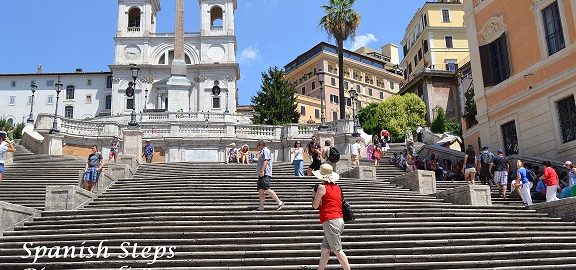Travel Italy: Italian Hosts and their Guests
Follow Caterina and read about Italian hosts and their guests in Italy in the Conversational Italian for Travelers series of books!
The Conversational Italian for Travelers textbook begins each chapter with a dialogue from a story about the character Caterina, an American girl who travels to Italy to visit her relatives. As the story continues from one chapter to the next, we learn Italian, and about Italy, in an engaging way through Caterina’s experiences.
Italian Hosts and their Guests
Italian hosts are found throughout Italy, as a multitude of tourists from all countries of the world visit the bustling cities, ancient mountain towns and stunning seaside resorts that Italy is known for. And, Italian hospitality is well-known to those who visit Italy. Italian hosts in family restaurants or shops even invite guests in with the exclamation, “Benvenuti!” “Welcome all!”
In our story, Caterina is a guest at the house of her Italian cousin Pietro and his wife Francesca. She counts herself lucky to have family to visit in Italy, and her visit is in turn celebrated by her Italian hosts. A warm, “welcome-home” dinner is planned upon her arrival and she is able to relax and visit with her cousins, grandmother and nephew on the first night of her Italian vacation.
Feel free to listen in on Caterina and her relatives on the day of her arrival to her cousin Pietro’s house with our FREE audio dialogue from “Chapter 7 – A Family Reunion” on www.LearnTravelItalian.com.
The Cultural Note below, adapted from the textbook found on Amazon.com, Conversational Italian for Travelers, gives some general guidelines about the Italian one needs to know to talk about celebrations in Italy and address Italian hosts and their guests.
—Kathryn Occhipinti
Italian Cultural Note:
Italian Hosts and their Guests
Several Italian words are commonly used to refer to hosts and their guests that sound very much like their English counterparts. But, beware! Despite similar pronunciation, the meaning of these words in Italian is often different from the English definition. Here are short but important explanations to clarify these issues.
Let’s start with an Italian word we already know: l’hostess. In Chapter 1 of our Conversational Italian for Travelers textbook, we learned that this word means stewardess and that a man working the same job is referred to as lo steward.
The word l’hostess does not have any other meaning in Italian, other than stewardess. So, other Italian words must be substituted for the English word hostess (a woman who has invited others to a gathering or party or to stay in her home).
L’ospite can be used to refer to the hostess of a party in Italy. However, l’ospite is also commonly used to refer to the guest!
Several common phrases can be used to clarify the situation…
For a hostess or host who has invited people into their home, the titles “la padrona di casa” or “il padrone di casa” are used.
For a party given outside the home, you can use the phrase, “la persona che invita” to refer to both a female or male host. It should be noted here that, although persona is a feminine word in Italian, it refers to all human beings, male and female; the plural would be le persone, of course!
To refer to an organizer/coordinator of an event or party, use, “l’organizzatore/l’organizzatrice della festa.”
Below is a table that summarizes these points:
| l’ospite | host, hostess guest |
| la padrona (di casa) | hostess (at her home)/homeowner, mistress |
| il padrone (di casa) | host (at his home)/homeowner, boss older meanings: ruler, master, lord (landowner) |
| la persona che invita | host or hostess (for event or party outside the home) |
| l’organizzatore | host/organizer/coordinator (for event or party outside the home) |
| l’organizzatrice | hostess/organizer/coordinator (for event or party outside the home) |
Here are some phrases to that refer to the type of celebration you may be invited to while in Italy by your Italian friends. If you stay in Italy long enough, you are sure to run into a street fair or parade on a feast day, or a wedding or other holiday celebration. “Buon divertimento!” “Have a good time!”
| la festa/le feste | holiday(s), celebration(s) party(ies) |
| la festa di compleanno | birthday party |
| la festivà | religious holiday |
| fare una festa | to have/make a party |
| festeggiare | to celebrate or have a celebration to observe a holiday |
| fare festa | to celebrate/to party |
—Adapted from Conversational Italian for Travelers, “Vocabulary—Hosts and their Guests,” by Kathryn Occhipinti
Kathryn Occhipinti, MD, is the author of the
Conversational Italian for Travelers series of books and a teacher of Italian for travelers to Italy in the Peoria and Chicago area.
“Everything you need to know to enjoy your visit to Italy!”
Join my Conversational Italian! Facebook group and follow me on Twitter at StellaLucente@travelitalian1 and start to learn Italian today for FREE!
Conversational Italian! Facebook Group
Tweet @travelitalian1 for Stella Lucente Italian
YouTube videos to learn Italian are available from © Stella Lucente, LLC.
Learn Conversational Italian.
More information on and photographs of Italy can be found on Facebook Stella Lucente Italian and Pinterest Stella Lucente Italian.
Facebook Stella Lucente Italian
Pinterest Stella Lucente Italian
Visit learntravelitalian.com/download.html to purchase/download Conversational Italian for Travelers and find more interesting facts and helpful hints about getting around Italy! Learn how to buy train tickets online, how to make international and local telephone calls, and how to decipher Italian coffee names and restaurant menus, all while gaining the basic understanding of Italian that you will need to know to communicate easily and effectively while in Italy. —From the staff at Stella Lucente, LLC
Travel Italy: Italian Hosts and their Guests
